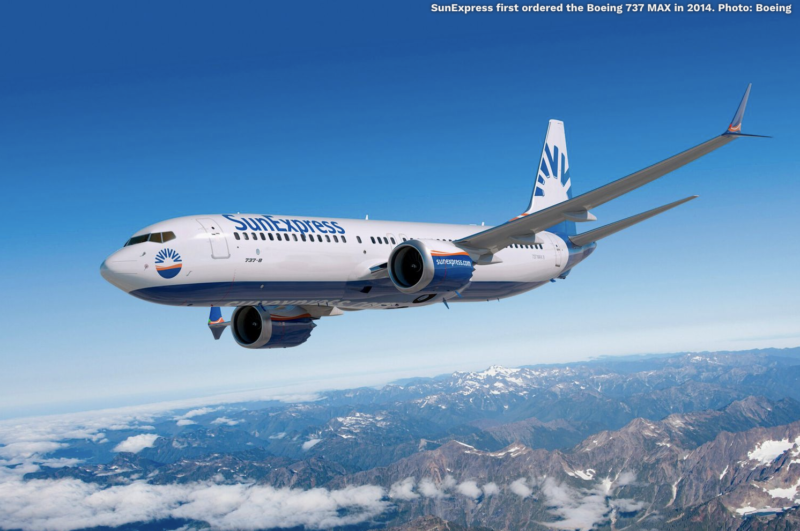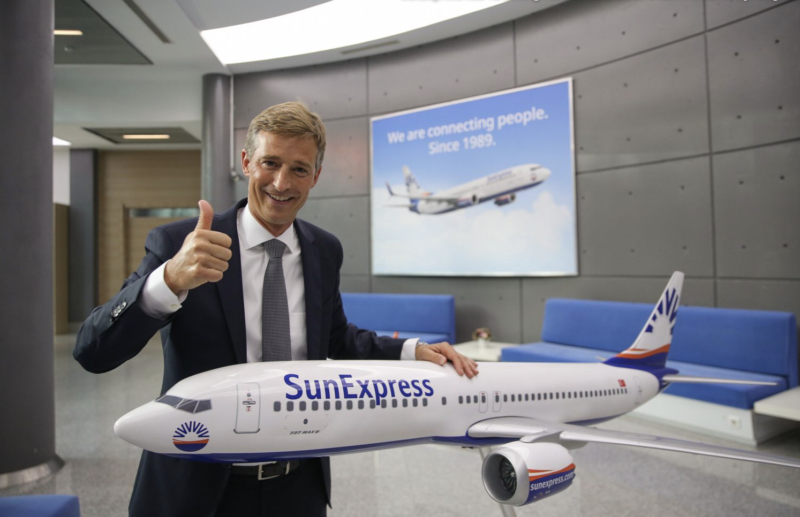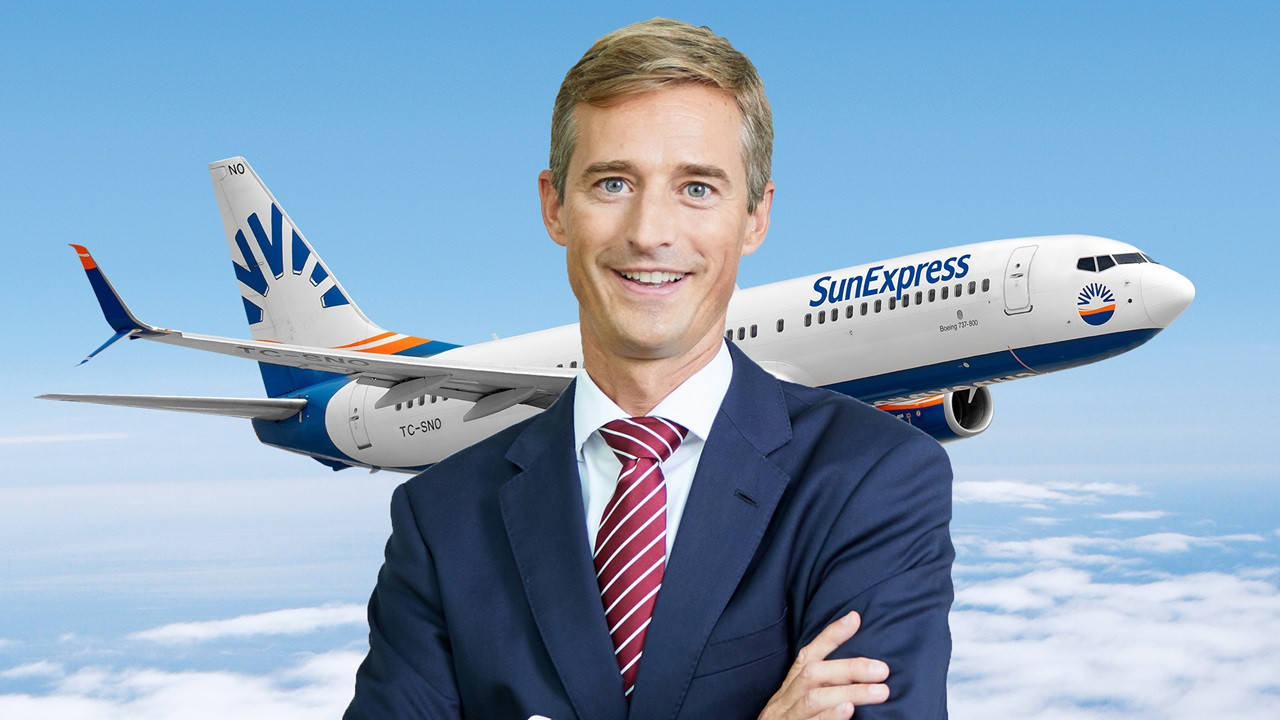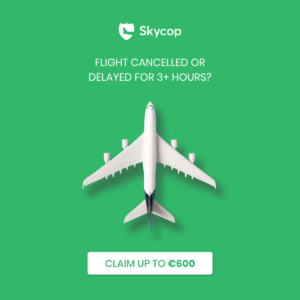Turkey-based leisure and domestic carrier SunExpress has received permission from U.S. and Canadian authorities to operate dry- and wet-lease services in North America.
However, regulatory work on the Turkish side has yet to be completed. Up to 10 aircraft could be transferred across the Atlantic temporarily to interested carriers.
SunExpress B737 MAX Operation
The airline is currently operating 47 Boeing aircraft, of which nine are 737 MAX 8s, SunExpress CEO Max Kownatzki told me recently in an exclusive interview in Antalya recently.
“We phased in all nine 737 MAX 8s within five weeks from mid-December to mid-January; one 737-800 has been retired,” Kownatzki said.
“We currently operate our 737 MAX fleet 16.5 hours per day, and we want to increase this level to over 17 hours daily.”
SunExpress CEO Max Kownatzki
The SunExpress 737-800NG fleet operates 16.2 hours per day during the summer peak.
From 2023 onwards, it will take delivery of five 737 MAX 8s every year until 2028 and an additional three in 2029; Beyond the 9 737 MAX 8 already operating, the airline has an additional 33 737 MAX 8s on order. "We have the option to use the 33 incoming aircraft for growth or fleet rollover," Kownatzki said. "Currently, the signs are to add the new aircraft for growth."
Kownatzki said SunExpress has also evaluated the larger 737 MAX 9 variant but concluded a 737 MAX 8 fleet fits the carrier’s needs best.
Theoretically, the 737 MAX would bring new opportunities regarding its longer range, Kownatzki said. “We could operate to Iceland,” he said. “But, also to India, a market to which we are currently looking into ... Our home turf is Turkey’s Riviera coast, where we want to grow further.”
The carrier will add 25 new routes in the summer of 2022, offering 16,250 additional frequencies of which 15,000 are to and from the Riviera coast. “If necessary, we have permission to wet-lease four additional aircraft,” Kownatzki said. A total of 175 routes to 60 destinations will be offered.

Who is SunExpress? Their Business Model
SunExpress’ business is based on three segments—tourism traffic, which generates about 45% of its business; VFR (40%); and domestic flights within Turkey.
A further 12 737-800s are operating for Turkish Airlines LCC AnadoluJet based on a wet-lease contract. “But the number of these wet-leased aircraft will be reduced to eight in the fourth quarter,” Kownatzki said.
Kownatzki said the outlook for summer 2022 remains strong, with some weeks already outperforming pre-pandemic demand in 2019. Since SunExpress does not have flights to Russia and Ukraine, in terms of operations, it is not affected by the war.
The carrier hedged 60% of its fuel for the 2022 summer capacity. “Some of our competitors in Turkey have zero percentage hedging. That means the topic of the fuel surcharge is in the market,” Kownatzki said. “But thanks to our hedging strategy, we can offer much lower fuel surcharges than our competitors.”
Kownatzki said SunExpress’ cost structure can easily compete with Turkish ULCC Pegasus.
For SunExpress, the summer to winter drop in terms of seasonality is about 40%. This created a fleet overcapacity during the European winter. “We work on partnerships during the winter in the Southern hemisphere, most notably South and North America,” Kownatzki said. “SunExpress is a multinational airline. [We have] 35 nations working with us, and we have a total of 3,500 employees.”
In 2021, the airline generated a profit of €59 million ($65 million), based on a 75% load factor, and it transported six million passengers.

Joint Venture of Turkish Airlines and Lufthansa Group
So far, the carrier has limited partnerships and is looking for further interline and code-share activities worldwide while the carrier is expecting to have a good share in a growing Turkish aviation market.
Besides some interline agreements with United Airlines, Air Canada, and Qatar Airways and a code-share agreement with Lufthansa, SunExpress wants to further expand with additional partnerships. "In terms of future code-share agreements, we are talking with multiple airlines in Europe and the Americas and are in advanced talks in the US and Canada", Kownatzki said. SunExpress could connect for example at the hubs of Lufthansa in Frankfurt or Munich or at the Turkish Airlines hub in Istanbul with partner airlines from Star Alliance.
Kownatzki mentioned another partnership, with Airbus A320neo operator Air Cairo, as important and has proven its value. "We sell over 70% of our tickets in Germany, Switzerland, and Austria. This is our strength. And there, Air Cairo could offer us additional capacity. Combining their cost-competitive, safe and high-quality products with our sales expertise in relevant source markets creates a win-win situation".
Therefore, a critical size for SunExpress in terms of a minimum number of aircraft is not necessary, as the carrier does not plan to operate its own long-haul flights or to establish an additional AOC in another foreign subsidiary, Kownatzki said.
SunExpress also reaffirmed its reason to exist. "We are the number one tourist carrier in Turkey and our profitable result positively contributed to Lufthansa Group financials in 2021. And the carrier continues operating in a market with growth perspectives.
Turkey expects to have 42 million touristic arrivals in 2022, generating a $35 billion tourism turnover. For 2023, the figures will rise to 63 million and 2028 to 100 million arrivals. We expect further growth.
SunExpress CEO Max Kownatzki
"The SunExpress joint venture of Turkish Airlines and Lufthansa Group as shareholders has been in place for 32 years and is a story of mutual respect and financial success. SunExpress is well established in this partnership".
Late January, Ahment Bolat took over the role as CEO of Turkish Airlines. Kownatzki expects further successful cooperation with Turkish Airlines, as Bolat is well-known in both companies and within Star Alliance. "While the two shareholders may to a certain extent be partially competing at the mainline level, you do have to differentiate that from their shareholder relationship to SunExpress which is a fully positive, respectful and successful one", he said.




